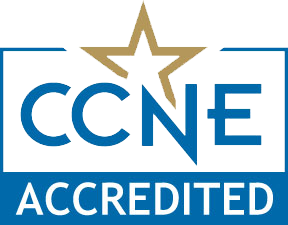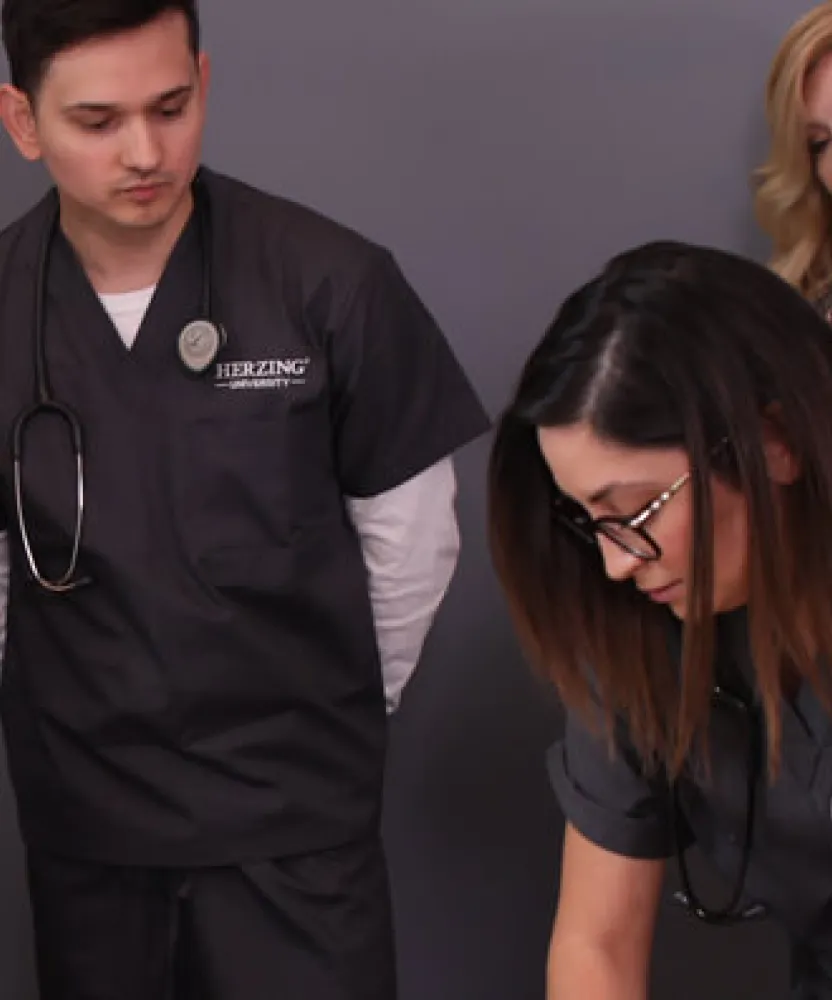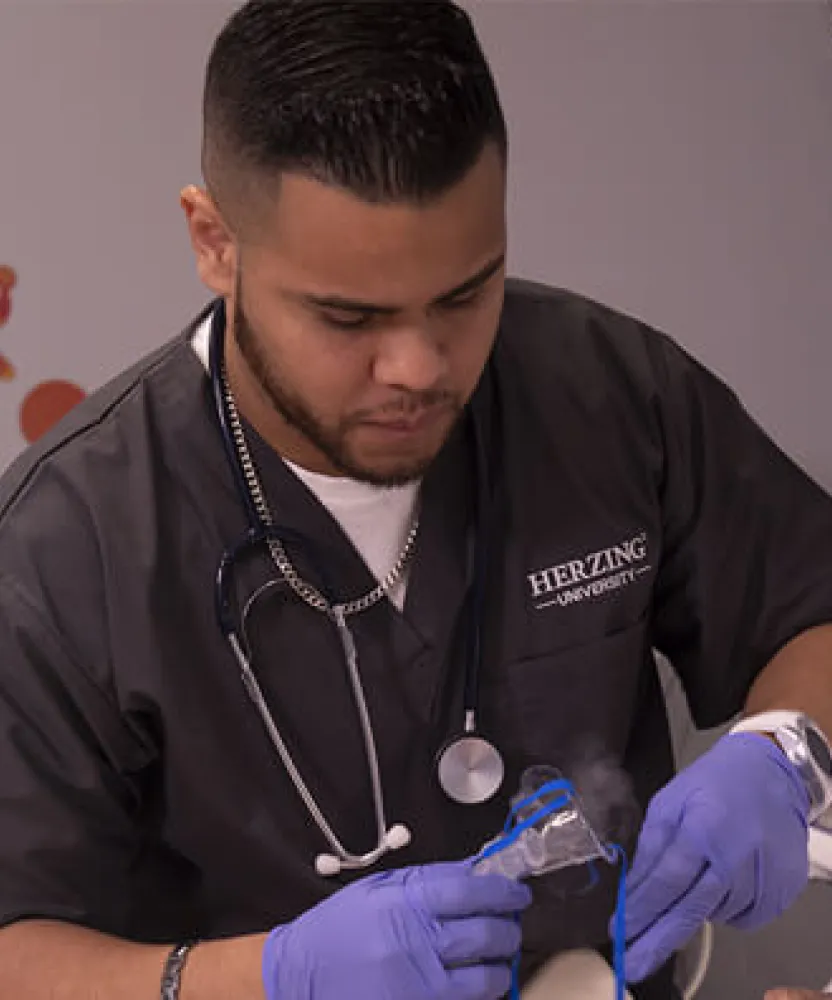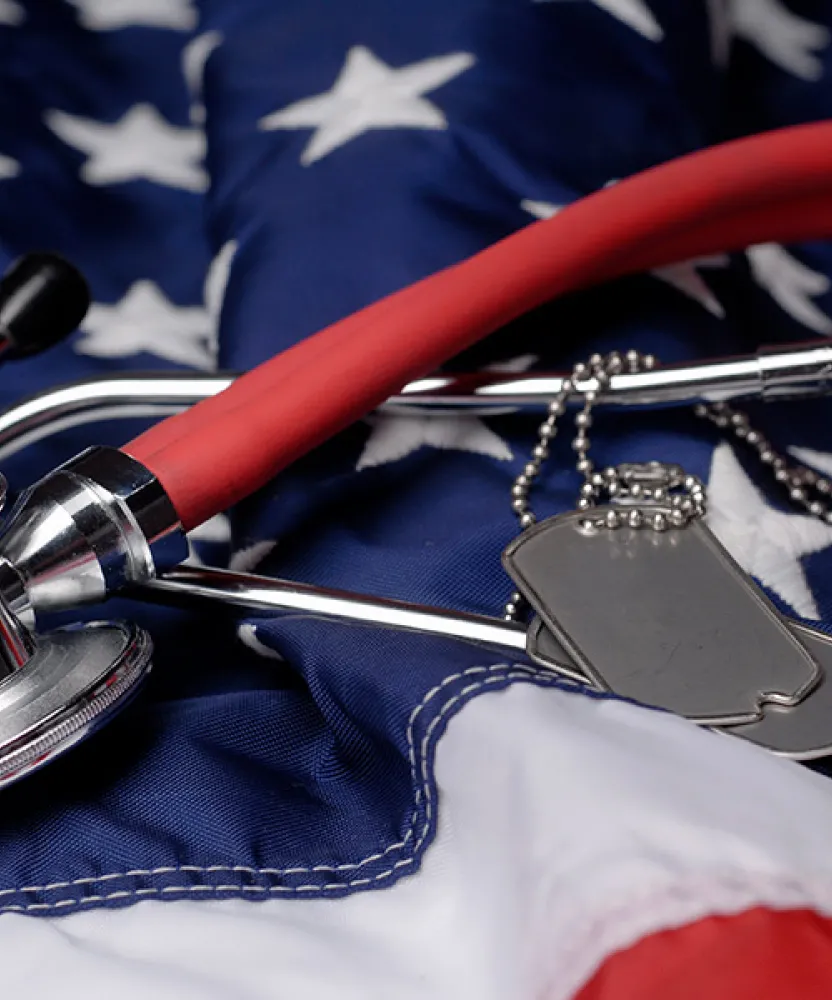Go from LPN to RN-BSN with Herzing
| Accreditation | CCNE accredited,† Accredited by the Higher Learning Commission |
|---|---|
| Transfer credit | Transfer up to 90 approved credits |
| Format | Core nursing courses at our campus in Kenosha, WI + online |
| Pathways | Earn dual credit towards a Master of Science in Nursing (MSN) |
| QuickPaths | Transfer credit, stackable credentials, and adaptive learning technology build a faster pathway to a higher education with Herzing University |
Learn More Today!
BSN Bridge for Practical Nurses - Kenosha, WI
The BSN Bridge option for LPNs is a 120-credit undergraduate program which prepares you for a career as a Registered Nurse (RN). The Kenosha campus bachelor's degree program provides students with fundamental knowledge and skills in the nursing process, health assessment, managing care, evidence-based practice, and much more.
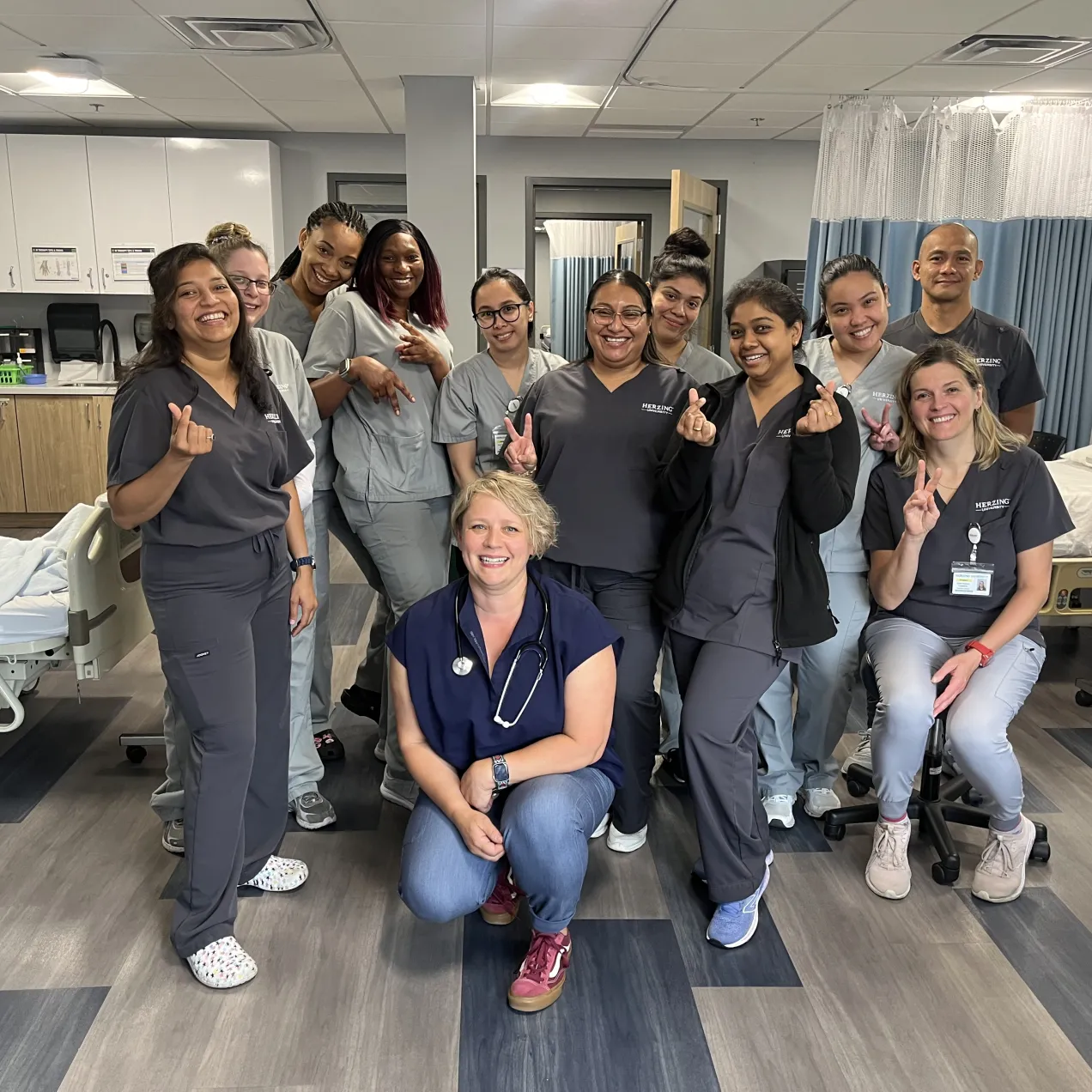
Career-focused curriculum
Discover the crucial knowledge and skills required to succeed in your work and build a foundation for continued career growth.
Flexible schedule
We work hard to help you maintain school-life balance, striving to be as flexible as possible for busy non-traditional students.
Experienced faculty
Get face-to-face instruction from experienced and credentialed faculty with real-world success in the field.
Lifelong support
We support your ongoing career advancement by providing comprehensive, personalized student services with lifelong career coaching.
Rolling admissions
No application deadlines to worry about. Apply when you’re ready and prepare to get started soon.
Kenosha LPN to RN-BSN program curriculum details
Herzing University's LPN to BSN bridge program in Kenosha expands on your previous training with classes focusing on providing quality, evidence-based patient care.
- On-campus. Complete core coursework on campus in Kenosha.
- Online. You may complete your general education prerequisites online.
- Clinicals. Clinical experience is vital to excel in your new career.
Upon successful completion, graduates are eligible to apply for the National Council Licensure Examination for Registered Nurses (NCLEX-RN) and meet the Wisconsin Board of Nursing requirements to obtain an RN license.
| Program | Monthsi | Semester Credits |
|---|---|---|
| Bachelor of Science in Nursing (BSN) - Bridge Option | 28 | 120 |
*Average number of months for students to complete program
Required Courses in Nursing
55.00 semester credit hours, are required.
Dual Credit Option for Taking Graduate Level Courses
Dual Credit Options are not available for New Orleans students. See Academic Information for full requirements under title Earning Graduate Credits as an Undergraduate Student. Undergraduate Course Graduate Course Equivalency NSG 321 Advanced Leadership and Management NU 730 Systems-Based Practice (Transferrable to MSN & DNP Programs) NSG 324 Evidence Based Practice in Nursing NU 602 Epidemiology, Research, and Theory (Transferrable to BSN to DNP Program Only) NSG 421 Nursing Informatics NU 725 Technology and Nursing Informatics in Advanced Practice (Transferrable to MSN & DNP Programs) NSG 423 Policy, Trends, & Ethics in Nursing HA 610 Health Policy and Management (Transferrable to MSN Program, except for MSNWHNP)
Required Courses in General Education
Students enrolled in the BSN program must complete a minimum of 41.00 semester credit hours in general education distributed among the following disciplines. A minimum of 9.00 semester credit hours must be upper level (300- to 400-level courses). The Herzing University General Education offerings are listed below. Refer to the General Education section of the catalog for additional information on general education requirements. 12.00 Semester Credit Hours in Communications EN 104 English Composition I EN 111 Information Literacy EN 116 Speech EN 304 English Composition II 14.00 Semester Credit Hours in Science SC 154 Anatomy and Physiology I for Nurses SC 254 Anatomy and Physiology II for Nurses SC 166 Microbiology SC 186 Chemistry 6.00 Semester Credit Hours in Humanities HU 140 Cultural Diversity HU 340 Humanities and Contemporary Popular Culture 6.00 Semester Credit Hours in Mathematics MA 109 College Algebra MA 320 Statistics 3.00 Semester Credit Hours in Social or Behavioral Science PS 101 Psychology Note: Transfer students may transfer courses that are within 1.00 semester credit hour of the courses listed above to meet these discipline requirements. Any resulting deficiency in the total of 41.00 semester credit hours required in general education may be made up with general education electives from any of the listed disciplines. Science courses being transferred in from other institutions must meet the nursing program science requirements.
Special General Education Grading Requirements for Nursing Support Courses
The following science courses must be completed with a grade of "B" (80%) or better. Only two attempts are permitted for each course and a student who fails to successfully complete in the maximum attempts is subject to dismissal from the nursing program. SC 154 Anatomy and Physiology I for Nurses Semester Credit Hours: 4.00 SC 254 Anatomy and Physiology II for Nurses Semester Credit Hours: 4.00 The following general education courses must be completed with a grade of "C" (70%) or better for a student to continue in the nursing program. SC 166 Microbiology Semester Credit Hours: 3.00 MA 109 College Algebra Semester Credit Hours: 3.00 MA 320 Statistics Semester Credit Hours: 3.00 A student who is dropped from the nursing program for failing to achieve the minimum grade specified in the courses listed above, but who otherwise meets the academic standards of the University may transfer to another Herzing degree program and/or may appeal to reapply to the BSN nursing program in a future semester. Resuming students should refer to the section on re-entering for additional requirements.
Distribution of Contact Hours by Course
Distribution of Contact Hours by Course Course Lecture Hours Lab Hours Clinical Hours Total Contact Hours Credits NSG 120 45.00 0.00 0.00 45.00 3.00 NSG 124 45.00 0.00 0.00 45.00 3.00 NSG 126 15.00 30.00 45.00 90.00 3.00 NSG 221 45.00 0.00 45.00 90.00 4.00 NSG 222 60.00 0.00 90.00 150.00 6.00 NSG 223 60.00 0.00 90.00 150.00 6.00 NSG 321 45.00 0.00 0.00 45.00 3.00 NSG 323 60.00 0.00 45.00 105.00 5.00 NSG 324 45.00 0.00 0.00 45.00 3.00 NSG 421 45.00 0.00 0.00 45.00 3.00 NSG 233 45.00 30.00 45.00 120.00 5.00 NSG 423 45.00 0.00 0.00 45.00 3.00 NSG 425 30.00 0.00 135.00 165.00 5.00 NSG 426 45.00 0.00 0.00 45.00 3.00 EN 101 45.00 0.00 0.00 45.00 3.00 EN 111 45.00 0.00 0.00 45.00 3.00 EN 116 45.00 0.00 0.00 45.00 3.00 EN 304 45.00 0.00 0.00 45.00 3.00 HU 140 45.00 0.00 0.00 45.00 3.00 HU 340 45.00 0.00 0.00 45.00 3.00 MA 109 45.00 0.00 0.00 45.00 3.00 MA 320 45.00 0.00 0.00 45.00 3.00 PS 101 45.00 0.00 0.00 45.00 3.00 SC 154 45.00 30.00 0.00 75.00 4.00 SC 254 45.00 30.00 0.00 75.00 4.00 SC 166 30.00 30.00 0.00 60.00 3.00 SC 186 30.00 30.00 0.00 60.00 3.00 Total 1185.00 180.00 495.00 1860.00 96.00 Block Credit for Licensure* 150.00 24.00 Total Semester Credits 120.00 *Students in Virginia will receive 150 hours of clinical hours for an earned PN/VN license only. For Virginia students who are admitted to the program and do not have an earned PN/VN license, an additional clinical course (NSG 011 – Nursing Clinical Practice Extension) will be offered to ensure the 500 clinical hours required by the Virigina Board of Nursing to sit for the NCLEX-RN® are met.
Accreditation
Our accredited BSN Bridge Option
We strive to earn rank as one of the top private, nonprofit universities in the United States. Just as you work every day to become the best version of yourself, so do we as a university.
We are proud to have attained institutional accreditation, as well as programmatic accreditation for our BSN Bridge Option in Kenosha.
✝The baccalaureate degree program in nursing at Herzing University Kenosha is accredited by the Commission on Collegiate Nursing Education (http://www.ccneaccreditation.org).
Herzing University is institutionally accredited by the Higher Learning Commission (hlcommission.org), a regional accreditation agency recognized by the U.S. Department of Education.
Enrollment requirements
To be considered for admission into the program, you must hold a high school diploma or equivalent (Diploma, HSED or GED) and meet the following criteria based on your cumulative GPA:
| Cumulative GPAi | Science Requirement | TEASii |
| 3.50–4.00 | None | None |
| 3.00–3.49 | 3.00 GPA in college scienceiii | None |
| 2.50 and higher | None | Composite TEAS of 58 |
i. Students with 18 or more transferable collegiate credits will be assessed on their collegiate cumulative GPA. Otherwise, the high school GPA will be used. ii. The Test of Essential Academic Skills (TEAS) from the Assessment Technology Institute (ATI). iii. Based on your cumulative GPA in these college science courses: Anatomy & Physiology I and II, Biology, Chemistry, and Microbiology. Two of these courses must be used to calculate science GPA. Any of these courses completed must be included in the calculation, and no others. If you do not meet this requirement, you must score a composite score of 58 or higher on the TEAS. A grade of "B" or better must be earned for transfer credit to be awarded for Anatomy & Physiology, regardless of whether it was included in the calculation. | ||
Waived Enrollment Fee
Discover the educational pathway designed to maximize your career potential. Reach for greater heights with Herzing University.
You may qualify for our online option
We now offer an online BSN Bridge option for LPNs featuring asynchronous didactic (lecture) courses, meaning you can complete all gen ed and core nursing courses online on your own schedule.i
The online bridge option includes practical, hands-on training including clinicals and intensives, which you must attend at a designated Herzing or partner site.
This can be a great choice if you are seeking maximum flexibility in completing your didactic coursework throughout the program.
i. The online and on-campus programs have unique enrollment requirements. View our online LPN to BSN Bridge Option admission requirements.
Going from LPN to RN
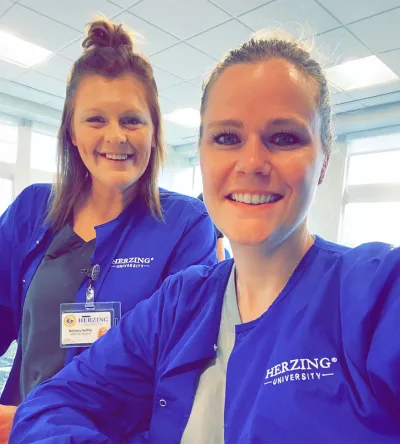
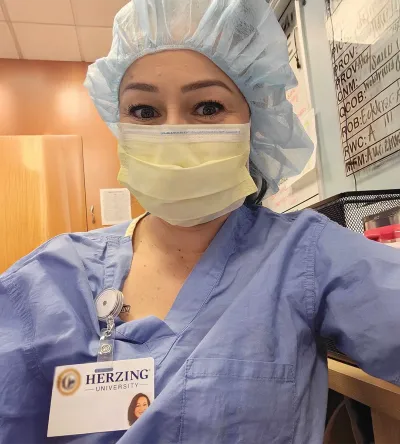
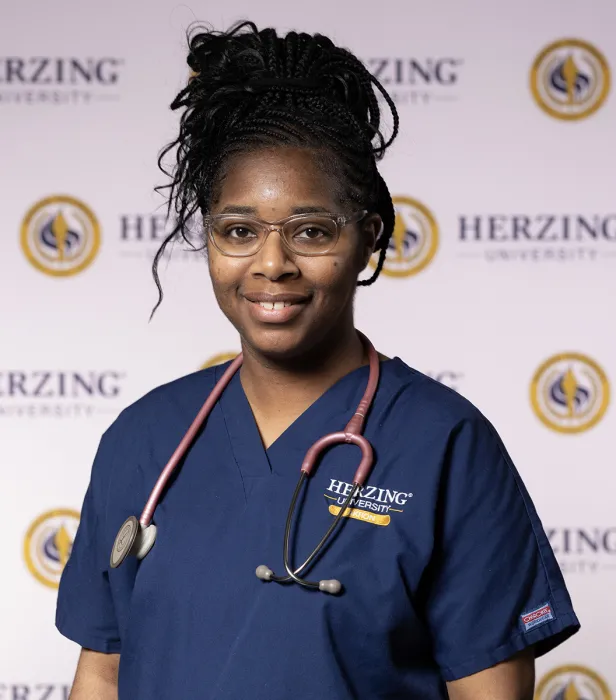
As a registered nurse you’ll be the backbone of day-to-day operations in many healthcare settings. RNs help to:
- Develop and direct treatment plans
- Counsel patients and family members
- Ensure patient comfort
- Serve as the key connection between doctors and patients
Registered Nurse ranks as the #18 Best Healthcare Job for 2025 according to U.S. News & World Report.
Approved roles and responsibilities for both LPNs/LVNs and RNs vary by state. But generally speaking, RNs enjoy a significantly broader scope of practice than LPNs. Earn an undergraduate nursing degree and you can discover new levels of career mobility.
Transitioning from LPN to RN represents an expansion of your scope of practice, higher salary potential, and greater career prospects in the future.
Job outlook and pay potential
According to the Bureau of Labor Statistics, employment of registered nurse is expected to increase 5% from 2024-2034.*
Registered nurses earn an average salary of $98,430 per year ($47.32 per hour). That would represent a significant raise for the average LPN/LVN in the US ($64,150 per year, $30.84 per hour).
You can take a big step forward in your nursing career by becoming an RN.
Faq
Frequently Asked Questions
Didn't find the answer to your question? Send us an inquiry and we will be happy to answer all your questions!
Our nursing programs are designed to be challenging, but not impossible. Your career as a registered nurse will be demanding, and our goal is to help you succeed and become the best healthcare provider you can be. We won’t do you any favors by making things too easy.
Learn more about how hard nursing school really is from Herzing graduates who have been through it. You will have support from Herzing University faculty, staff and other students every step of the way. Never be afraid to ask for help when you need it!
Regulation has been deliberated for many years. There is currently only one state which has taken concrete action to make BSNs effectively mandatory for nurses – New York. Their “BSN in 10” bill, passed in January 2017, requires registered nurses holding an associate degree to earn their BSN qualification within 10 years of their initial RN licensure.
Two primary competing factors cloud the issue:
- Hospitals are incentivized to hire more BSN-prepared nurses. Organizations seeking Magnet Recognition must require all nurse managers to hold a BSN.
- Nurses are in very high demand. The American Association of Colleges of Nursing (AACN) calls it a shortage in nursing. Raising minimum education requirements may decrease the pool of eligible employable RNs.
Because of the high demand for nurses, sweeping legislation making bachelor’s degrees mandatory across the board seems unlikely. However, make sure to keep an eye on what’s happening in your state!
The cost varies based on several factors, including credits you’re able to transfer, campus location, and financial aid for which you are eligible.
You can use our Tuition Wizard to estimate tuition, discover scholarship and grant possibilities, and find out how much transfer credit can lower the cost.
While Registered Nurses (RN) and Licensed Practical Nurses (LPN) often work together in collaboration in hospitals and other healthcare facilities, their roles and responsibilities are very different. Learn more about the biggest differences between practical nurses (LPN/LVN) and registered nurses (RN).
The advantages of a BSN can include:
- Increased autonomy in decision making while on the job
- Open doors to more specialties in the nursing field
- Become a more attractive candidate for hospitals seeking Magnet Recognition
- Build a foundation to grow into education or leadership pathways
- Positions you better for nursing jobs with higher pay
- Qualify to enroll in an MSN program
- Become more familiar and educated with evidence-based practice opportunities
- Increase knowledge and understanding of RN specialties and skills
- Transition from “technical” to “professional” RN
- Gain a deeper knowledge of nursing theory and leadership theory
A 2023 study from the American Association of Colleges of Nursing (AACN) indicates employers have the level of education at top of mind in the hiring process. Based on responses from nursing schools, the survey revealed 69.8% of employers show a strong preference for BSN graduates.
The ultimate benefit is bettering yourself, becoming the best nurse you can be and following the career path of your choosing.
The length of the degree program roughly estimates a baseline for how long it would take for you to go from LPN to RN.
Earning a degree does not by itself make you eligible to practice. You’ll need to pass the NCLEX-RN and meet the Board of Nursing requirements in your state. These additional steps don’t take too much extra time after graduation. How long you have to wait after graduation to take the NCLEX depends on state requirements, but you can generally expect to take the exam within 1-2 months.
You can potentially get an education and become an RN faster on the associate degree path. With prior LPN education and experience, you can earn an ASN in as few as 16 months through our program.
The LPN to BSN pathway takes longer (28 months through our program), but there are many benefits to taking the extra time to earn a bachelor’s degree.
According to the Bureau of Labor Statistics, the average salary for registered nurses is $98,430 per year ($47.32 per hour)*. Nurses with a bachelor’s degree tend to fall on the upper side of that average due to their advanced education and their qualification to help hospitals earn Magnet Recognition.
The BLS projects a 5% increase in need for registered nurses from 2024-2034.* RNs are in demand, and earning a BSN can help your resume stand out and give you a better chance of getting the job you really want.
It’s a question of:
- What your goals are
- How quickly you want to reach them
If your goal is to go from LPN to RN quickly, the best choice may be an associate’s degree program since you may be able to become an RN in less than 2 years.
If your goal is to become an RN and potentially advance further by working towards a master’s degree in nursing (MSN), your best option is a bachelor’s degree in nursing program.
Read about the most basic differences between ADN vs. BSN and discover what's best for you.
There are many different nursing specialties to choose from. Depending on your personality, educational background and preferred working environment you can follow your own personalized path in the nursing profession.
Here are a few popular nursing specialties you may consider:
- Aesthetic or Cosmetic nurse
- Assisted living nurse
- Cardiac/cardiovascular nurse
- Emergency room nurse
- Flight nurse
- Home health nurse
- Labor and Delivery nurse (L&D)
- Med/surgical nurse
- Neonatal/NICU nurse
- Nurse Anesthetist
- Nurse paralegal
- Oncology nurse
- Pediatric nurse
- Public health nurse
- School nurse
- Travel nurse
You can take our nursing personality quiz to get a better idea of what you might prefer in your nursing career.
"Registered nurse" represents a broad category of potential duties involving many areas of healthcare. The typical roles and responsibilities of an RN span several categories, including:
The Student Experience at Herzing
I had already been an LPN for eight years and knew that my BSN was the next step in my career.
Victor Kanyendo
Nursing Student | Kenosha CampusHerzing accepted my previous classes in an LPN program, so I was able to finish my BSN degree in no time!
Ingrid Eleosida
Nursing Student | Kenosha CampusEverybody at Herzing is nice and friendly, and I became happier here.
Christine Paul Cardenas
Nursing Student | Kenosha CampusDisclosures
Herzing University is accredited by the Higher Learning Commission (hlcommission.org), an institutional accreditation agency recognized by the U.S. Department of Education.
* BLS pay estimates calculate the median annual wage for various occupations. Per the BLS the median wage for an occupation is: "The wage at which half of the workers in the occupation earned more than that amount, and half earned less. Median wage data are from the BLS Occupational Employment and Wage Statistics survey." Bureau of Labor Statistics (BLS), U.S. Department of Labor, Occupational Outlook Handbook 2024. BLS median wage estimates do not represent entry-level wages and/or salaries. Multiple factors, including prior experience, age, geographic market in which you want to work, and degree level and field, will affect career outcomes, including starting salary and earnings as an experienced employee. Herzing neither represents that its graduates will earn the median salaries calculated by BLS for a particular job nor guarantees that graduation from its program will result in a job, promotion, particular wage or salary, or other career growth.
Recent Blog Posts
Waived Enrollment Fee
Discover the educational pathway designed to maximize your career potential. Reach for greater heights with Herzing University.

